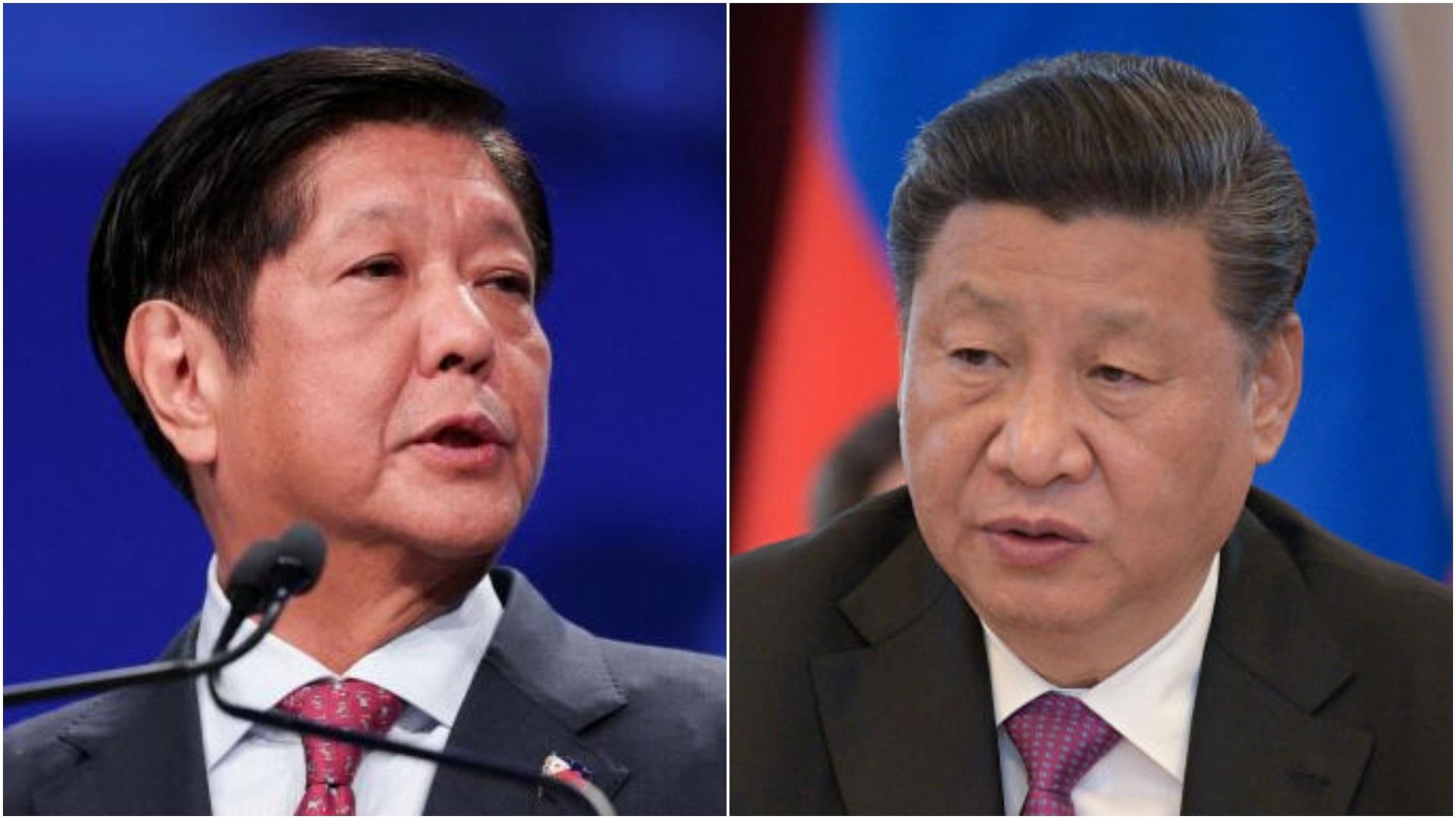
Ferdinand Marcos (L) and Xi Jinping (R).
Credit: Reuters Photo
In the last few months, the Philippines and the waters around it have witnessed continuous Chinese aggression. Beijing claims almost all the waters. The most recent incident occurred when Chinese naval vessels attacked a Philippines resupply mission in March. The mission was directed to provide supplies to marines who have been living on a stranded ship of World War II generation on one of the contested reefs. The dispute is around the Second Thomas Shoal which has been a hotbed of confrontation for almost one year now. The Philippines ships suffered major damage and the crew got injured too. However, this is not the first time that Beijing has undertaken such acts.
No surprise then that in a recent statement, President Ferdinand Marcos adopted a sterner stance and asserted that the Philippines will not be “cowed into silence, submission, or subservience”. Since taking office in 2022, Marcos has adopted a stronger tone towards Beijing’s actions. His predecessor Rodrigo Duterte had undertaken a more conciliatory tone towards China and was encouraging economic engagement. Chinese President Xi Jinping had recently praised Duterte and said that he had “resolutely made the strategic choice of improving relations with China, with an attitude of being responsible to the people and history”.
The general Chinese stance has been one of being the victim. Beijing has consistently reiterated that it is the Philippines which is the aggressor and is meddling with its affairs, and not respecting Chinese sovereignty. The Chinese defence ministry spokesperson said, “the Philippines was to blame for the breakdown of relations, demanding its neighbour to cease what it calls were acts of infringement and provocation”. While the Global Times quoted Gu Xiaosong, dean of the ASEAN Research Institute of Hainan Tropical Ocean University saying, the Philippines should not “ignore China's restraint” and “infringe on China's legitimate sovereignty and interests in the South China”. Such statements make it clear that China is not going to shy away from using force, and is not interested in any kind of bilateral negotiations or international arbitration, as China had unilaterally refused to acknowledge the 2016 decision of the Hague Court of Arbitration.
To make matters complicated for Beijing, India has also shown support for Manila. During his recent visit to the Philippines, External Affairs Minister S Jaishankar reiterated the need for a rules-based order and asserted the need to follow the UNCLOS. To complement New Delhi’s stand, Manila stated that India and the Philippines have “decided to accelerate maritime cooperation” and “will look at promising areas for collaboration, such as maritime domain awareness, shipping and seafaring, search and rescue, law enforcement and environmental protection”. India reiterated that Beijing should respect the 2016 ruling which was in Manila’s favour.
The situation has been deteriorating for the last few months. One of the major triggers can be the growing warmth between Washington and Manila under Marcos. Manila has been keen to increase defence ties with the United States, while undertaking joint air and naval training and giving access to Philippine military bases.
Another factor is the January announcement by Filipino General Romeo Brawner that Manila is keen to build infrastructure on all the islands and reefs it regards as its territory. This is a move to catch up with China. However, there are reports that Manila is ready to set up a “de facto military base on the Second Thomas Shoal, the site of recent violent encounters”. In addition, Manila is also asserting its position to become an important partner in the Indo-Pacific.
China has always maintained that it is the largest power in the South China Sea and thus the smaller nations are not in a position to challenge it. Till Manila was closer to Beijing and was not challenging China’s position, the relationship was acceptable. However, under Marcos, Manila’s foreign policy is becoming more assertive and nationalistic, a change which challenges Beijing’s unilateral claims. To make matters worse, Washington and New Delhi have both shown support for Manila’s stance. The growing reach of India in the South China Sea also upsets Beijing as it regards this region as its sphere.
China’s consistent aggression and challenging other states’ sovereignty has become a part of Beijing’s foreign policy posturing. It appears that it wants its neighbours to acknowledge China’s centrality and is consistently annoyed when countries attempt to balance its position. China is not shying away from flexing its muscle, and pushing its narrative while expecting the world to readily accept it. The only sovereignty which matters for Beijing, when it comes to any kind of territorial dispute, is its own.
(Gunjan Singh is Associate Professor, OP Jindal Global University)
Disclaimer: The views expressed above are the author's own. They do not necessarily reflect the views of DH.